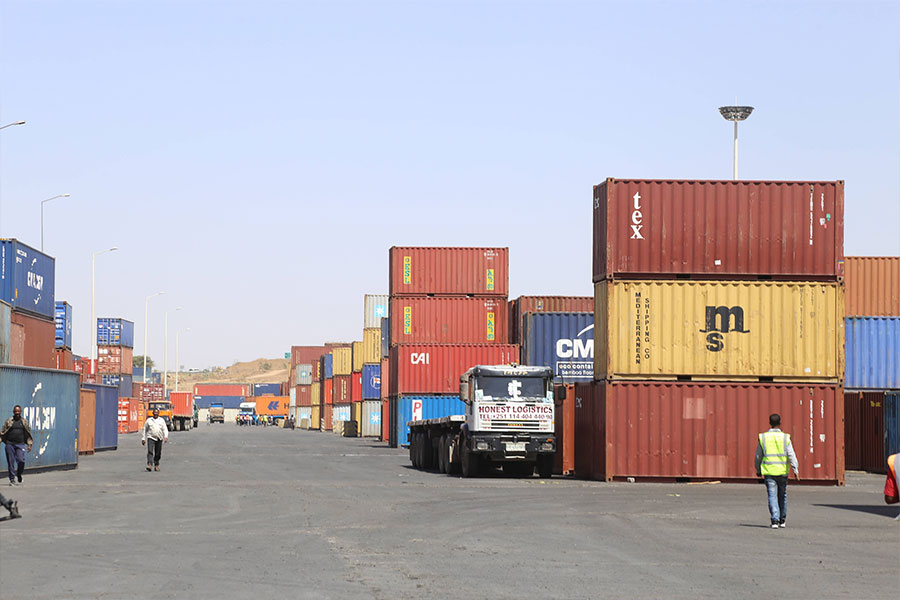
Fortune News | Aug 28,2021
Alem Aschalew, a major shareholder and CEO of Yekassa General Contractor, had high hopes when his company was awarded the contract to erect a seven-storey building six years ago. Sitting on a 2,000sqm plot around the Addisu Gebeya neighbourhood in northern Addis Abeba, the project was initially projected to cost 76 million Br.
Issues with right of way had already caused a four-year delay in the hands of another contractor before Yekassa, a grade-four construction company incorporated in 2013, took over. The project owner was keen to speed things up, and the contractor has been hard at work on the building's structural works. Additional finance was needed.
Midway through the construction, the project owner had filed for a 15 million Br loan from the state-owned Commercial Bank of Ethiopia (CBE). The contractor agreed to cover costs from its resources while the loan application was under review to avoid additional delays. In July this year, Yekassa was erecting the structure for the sixth floor. An unexpected jeopardising of the project's progress happened in the following month.
The central bank had ordered all commercial banks to suspend asset-based collateralised loans. The decision came as a shock to many, including the management of Yekassa. The predicament was made worse as regulators had not specified how long the freeze was to last.
"We had to stop the project right away," said Alem.
His company, with a capital of 28 million Br, was forced to lay off or reassign up to 70 temporary staff members.
Regulators had expected the freeze to last longer. But four months after its enforcement, through text messages regulators sent to executives of the commercial banks, the authorities lifted the freeze last week. It came too late for Alem and his management team at Yekassa. The construction company had already spent four million Birr to finance the construction.
Neither has the reinstatement of collateralised loans meant that construction continues immediately. The loan approval process at the CBE has yet to be restarted, though when has not been determined.
"The process will take four or five months," said Alem.
This is a story many in the construction industry share. Growing by an average of 11pc annually for more than a decade and providing jobs for five percent of the national workforce of over 41 million, it is an economic powerhouse. Before the freeze, the industry was a primary recipient of loans from commercial banks. It received 28.6 billion Br in loans from commercial banks last year, and 16.4 billion Br in credit from the Development Bank of Ethiopia and other sources over the same period, according to data from the central bank.
However, the industry was not spared when the authorities enforced a loan freeze in a desperate move to control the spiralling gap between the official and unofficial foreign currency exchange rates. The exchange rate in the parallel market registered nearly 55pc higher than official rates four months ago. The authorities saw it as the work of 'economic sabotage'.
The freeze targeted at reducing this gap, says Solomon Desta, vice governor of financial institutions at the National Bank of Ethiopia (NBE).
"We've achieved what we set out to do," he told Fortune.
The parallel-market rate has dropped to 62 Br for a dollar, although it remained nearly 25pc higher than the official rate last week.
The construction industry was not the only market player affected by the move, as the manufacturing sector took a hit, too. The sector received over 60 billion Br in loans last year.
Elauto Engineering Group, a company assembling knocked-down parts from Chery Automobile & JAC Motors (Chinese state-owned vehicle manufacturers), saw business stagnate following the freeze. Incorporated three years ago, Elauto depends on loans of up to 300 million Br annually for working capital. The loan suspension came like a storm for its management.
“It was shocking news for businesses like ours,” said Bekele Abebe, chief executive officer (CEO) of Elauto.
The company can assemble 30 vehicles a day at its plant in Bishoftu, 45Km southeast of the capital in the Oromia Regional State. However, liquidity constraints resulting from the freeze made it difficult to pay customs duties, and overhead costs forced it to cut production. It assembles up to seven vehicles a day, with its employees working only one shift.
"There's no question we can produce at capacity if we had better cash flow," said Bekele. Elauto is preparing to erect an additional assembly plant in Dire Dawa in October after securing 1.8ht of land in the industrial park there.
Though the past four months have been anything but pleasant for those in the construction and manufacturing sectors, the biggest victim is undoubtedly the financial sector. It will have far-reaching effects on the banking industry where interest on loans accounts for 75pc of total earnings, says Abdulmenan Mohammed, a financial statement analyst.
“Freezing loan disbursement for four months has a considerable negative impact on their profitability,” he said.
Commercial banks disbursed 38.3 billion Br in loans over the first quarter of the last fiscal year. One-third of it went into domestic trade. No less was funnelled to finance international trade, and the remaining was shared between seven other economic sectors. A few weeks into the loan freeze, the authorities relaxed their grip on some loan categories. But bankers report that their first-quarter earnings from loans this year were nowhere near what they had expected.
Zemen Bank is among those that were hit the hardest. The Bank planned to increase loan disbursements by 40pc this year, distributed evenly across quarters. However, it only recorded a nearly negligible growth of 2.6pc in the first quarter. It barely disbursed credit between August and October.
“The loan freeze has affected us significantly," said Asrat Tadesse, vice president of Zemen Bank.
Things picked up a little last month as coffee exporters, exempted from the freeze in September, began to process loans. The Vice President disclosed that khat exporters had requested credit since the industry was exempted last month.
International trade, mainly export, accounts for 40pc of all loans Zemen has disbursed thus far this year. Consumer loans granted against vehicles follow with 17pc.
"Export will probably be the biggest recipient this year," said Asrat.
However, the impact of the freeze will likely go beyond slashing income from lending activities, according to a senior executive of one of the first-generation banks who requested anonymity. He has observed that slowed economic activities combined with the freeze have dampened deposit mobilisation and reduced overall income.
"There's no question that it's been harmful," he told Fortune.
Not everyone is on the same page reading the consequences of the loan freeze on the banks and beyond. The freeze comes when other factors, partly seasonal, contribute to a lull on the credit front. Ermias Andarge, president of Enat Bank, contends that the loan freeze coincided with a tax season, a time when loan repayments are usually at their lowest as businesses divert cash to settle tax obligations.
A directive from the central bank requiring all commercial banks to double their reserve ratio to 10pc beginning September this year is also a factor. It meant that liquidity levels at the banks were low, preventing banks from disbursing credit, according to Ermias.
However, Ermias acknowledged that if the loan freeze had not been lifted last week, it could have had potentially disastrous effects on the banking industry.
Some banks tried to survive the dry season by exploring other options such as investing in treasury bills (T-bills) and making fixed-time deposits at other banks with liquidity problems. A demand-driven treasury bill market is seen as a viable option for banks to invest money that would otherwise have been disbursed as loans and advances.
“This compensates for the interest income lost on loans and advances,” Asrat of Zemen Bank told Fortune.
The average weighted yield of T-bills was 8.1pc last year, almost half the standing average commercial lending rate of 14.5pc. The highest lending rate recorded last year was 21.5pc.
Vice Governor Solomon encourages these investments in diversified portfolios to avoid putting themselves in similar circumstances in the future.
“They shouldn't put all their eggs in one basket,” the Vice Governor told Fortune.
This is advice that sounds attractive, in theory, says Abdulmenan. In the real world, banks focus on certain sectors and industries because they pose less risk and have a higher demand for credit.
“Freezing loans will never induce banks to diversify,” he said.
The full depth and impact of the loan freeze on the broader economy have yet to be understood. At the micro-level, the trauma it brought onto the economic agents was immediate and painful. Yekassa General Contractor, for one, had to suspend construction on the building in Addisu Gebeya until the financing from the CBE comes through. With banks still getting back into the swing of things, it is unclear when that will be.
PUBLISHED ON
Dec 04,2021 [ VOL
22 , NO
1127]

Fortune News | Aug 28,2021

Viewpoints | Jun 08,2019

Fortune News | Jun 01,2019

Viewpoints | Jun 14,2025

Radar | Jan 09,2021

Fortune News | Feb 13,2021

Fortune News | Jan 12,2019

Fortune News | Dec 12,2020

Featured | Sep 10,2021

Commentaries | Jul 12,2025

Dec 22 , 2024 . By TIZITA SHEWAFERAW
Charged with transforming colossal state-owned enterprises into modern and competitiv...

Aug 18 , 2024 . By AKSAH ITALO
Although predictable Yonas Zerihun's job in the ride-hailing service is not immune to...

Jul 28 , 2024 . By TIZITA SHEWAFERAW
Unhabitual, perhaps too many, Samuel Gebreyohannes, 38, used to occasionally enjoy a couple of beers at breakfast. However, he recently swit...

Jul 13 , 2024 . By AKSAH ITALO
Investors who rely on tractors, trucks, and field vehicles for commuting, transporting commodities, and f...

Oct 25 , 2025
The regulatory machinery is on overdrive. In only two years, no fewer than 35 new pro...

Oct 18 , 2025
The political establishment, notably the ruling party and its top brass, has become p...

Oct 11 , 2025
Ladislas Farago, a roving Associated Press (AP) correspondent, arrived in Ethiopia in...

Oct 4 , 2025
Eyob Tekalegn (PhD) had been in the Governor's chair for only weeks when, on Septembe...